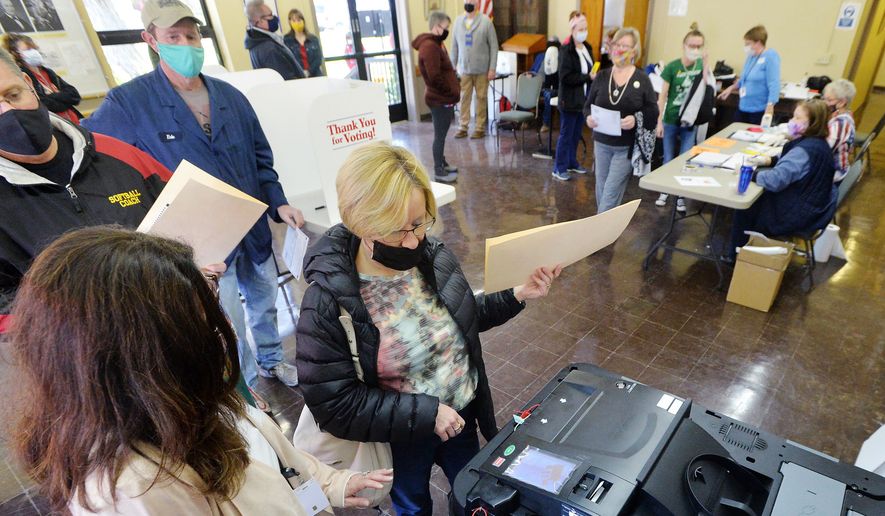Hours after House Democrats announced that a Pennsylvania postal worker had recanted allegations of ballot tampering, the mail carrier denied it, saying that he stands by his original statement and that he “got played” by federal investigators.
Richard Hopkins, a mail carrier in Erie, Pennsylvania, said in videos released Tuesday by Project Veritas that he never intended to recant his claims of possible ballot fraud after being grilled by investigators from the U.S. Postal Service Office of Inspector General.
“I am right at this very moment looking at an article written by the Washington Post. It says that I fabricated the allegations of ballot tampering,” Mr. Hopkins said in a video posted on Twitter. “I am here to say that I did not recant my statements. That did not happen. That is not what happened.”
Project Veritas chief legal counsel Jered Ede accused the investigators of coercing Mr. Hopkins into signing an affidavit recanting his claims; failing to give him access to his attorney, and refusing to provide him with a copy of the signed document.
“It was coerced,” Mr. Ede told the Washington Times. “They forced him to execute this watered-down lukewarm affidavit. They did so during an interrogation where again they denied him the opportunity to be represented by counsel even though he confirmed with them that he had counsel.”
Unknown to the federal investigators, Mr. Hopkins was wearing a wire during the interview provided by Project Veritas based on his concerns about being harassed at work by supervisors or union officials.
RECORDING: Federal agents “coerce” USPS whistleblower Hopkins to water down story. Hopkins doubles down…
— James O’Keefe (@JamesOKeefeIII) November 11, 2020
Agent Strasser: “I am trying to twist you a little bit”
“I am scaring you here”…” we have Senators involved…DOJ involved…reason they called me is to try to harness.” pic.twitter.com/tK2JPu6Wqm
USPS Whistleblower Richard Hopkins: “I DID NOT RECANT”@shawnboburg and @jacobbogage have been played by the same federal agents on the audio ‘coercing,’ ‘scaring’ the whistleblower to water down allegations. As reporters, they are REQUIRED to include Richard’s denial. REQUIRED pic.twitter.com/8Rj5yWSljz
— James O’Keefe (@JamesOKeefeIII) November 11, 2020
Project Veritas president James O’Keefe released a snippet of the exchange Tuesday in which a man identified as a USPS OIG investigator said that “this storm is getting crazy,” and that “the reason they called me in is to try to harness that storm, to try to reel it back in before it gets really crazy.”
Said Mr. Hopkins: “They were grilling the hell out of me. I feel like I just got played.”
His comments came after the House Oversight Committee tweeted Tuesday that Mr. Hopkins had “completely RECANTED his allegations of a supervisor tampering with mail-in ballots after being questioned by investigators,” citing the Office of Inspector General.
The investigators “informed Committee staff today that they interviewed Hopkins on Friday, but that Hopkins RECANTED HIS ALLEGATIONS yesterday and did not explain why he signed a false affidavit,” tweeted the committee.
BREAKING NEWS: Erie, Pa. #USPS whistleblower completely RECANTED his allegations of a supervisor tampering with mail-in ballots after being questioned by investigators, according to IG.
— Oversight Committee (@OversightDems) November 10, 2020
THREAD:
Mr. Hopkins said last week he was told to collect late mail-in ballots, and that he overheard his supervisor, Erie postmaster Robert Weisenbach, talk about backdating them to make it appear that the late ballots were received on Nov. 3.
Mr. Weisenbach has denied the allegations, calling them “100% false.”
The Pennsylvania Supreme Court ruled prior to the election that ballots dated on or before Nov. 3 would count as long as they were received by 5 p.m. Friday, Nov. 6.
Mr. Hopkins initially came forward last week as an anonymous whistle-blower with Project Veritas before revealing his identity in an affidavit, which was provided by the Trump campaign and released Saturday by Sen. Lindsey Graham, South Carolina Republican.
Mr. Ede said that the federal investigators refused to give Mr. Hopkins a copy of the document he had signed.
“He asked multiple times, can I have a copy of what you’re having me sign? They refused, even now, even after they have leaked to Congress and the Washington Post what he supposedly said in that signed statement,” Mr. Ede said.
He alleged that the federal investigator was “a fixer sent in to one job and one job only, and that is to come out with a recanting of the allegations, and he didn’t leave until he had it.”
“This is banana-republic, Soviet-era truth suppression tactics like I’ve never seen before,” Mr. Ede added.
A Project Veritas spokesperson said the group plans to release Wednesday more audio from the federal interview with Mr. Hopkins.
Mr. Hopkins said he did not believe the federal agents who interrogated him were interested in investigating alleged election fraud.
“Honestly, I don’t think they are,” he said.
Mr. Hopkins’ eyewitness account of organized ballot tampering in Pennsylvania is among a flood of voter fraud allegations in several states.
Based on these claims, many in sworn affidavits, the Trump campaign filed a dozen lawsuits challenging the election in Arizona, Michigan, Nevada and Pennsylvania, seeking to reverse projections of a win by former Vice President Joseph R. Biden.
• S.A. Miller can be reached at smiller@washingtontimes.com.
• Valerie Richardson can be reached at vrichardson@washingtontimes.com.




Please read our comment policy before commenting.